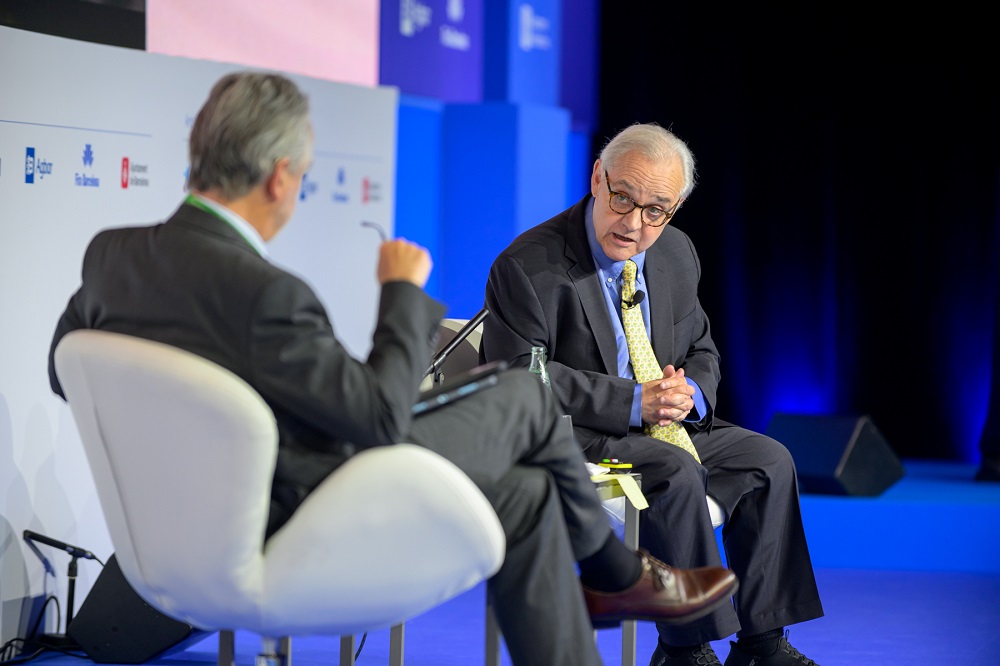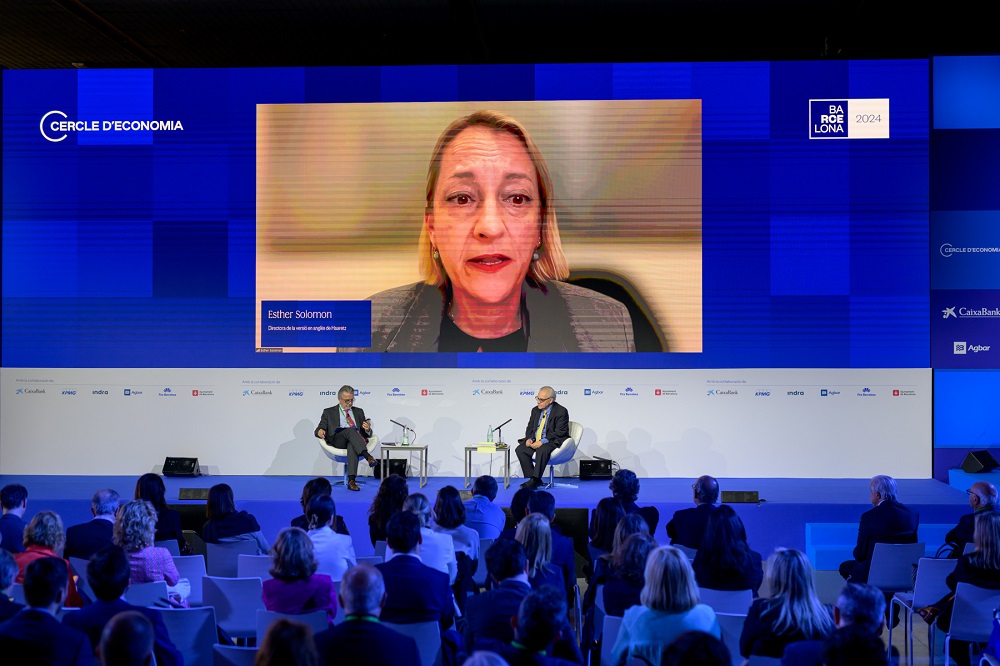In his presentation, Miguel Trias (member of the Board of Directors of Cercle d'Economia) framed the session in two main topics: on the one hand, the US elections and, on the other, the Gaza war, in this case with the possible effects of the situation in the Middle East on the outcome of the presidential elections in November.
Before entering the prospective analysis of the United States presidential elections, Eugene J. Dionne, a columnist for the Washington Post and a senior fellow in governance studies at the Brookings Institution, praised Barcelona and Spain "for their democratic transition," which he compared "to historical events such as the fall of the Berlin Wall." And on the subject, he highlighted the "uncertainty" of the future and the "importance" of the events of the coming months: "from these elections (in the United States) no one should assume that they have been decided, because they have not done so."
In an evocation of the 2016 presidential election (Donald Trump then beat Hillary Clinton), he described the polarization between metropolitan areas and rural areas as a "key factor" in Trump's rise, along with issues such as wars, immigration, the effects of the 2008 crisis and the support of working-class voters. Regarding the forecast for November, he indicated that "it is essentially a tie."
As for the current president, Joe Biden, he reasoned that he will have to overcome the "negative perception of many voters about the economic situation", the high prices of everyday products that "have increased compared to 2019" and the high interest rates that "despite solving inflation, are a real burden on many people". He reflected on the "complexity" of today's progressive coalitions, referred to the importance of the double hater group – those voters who, although they do not agree with either Trump or Biden, "are more likely to vote for Biden" – and pointed to voters over 65 because "their voting nature has changed." On electoral participation and, especially that of young people between 18 and 29 years old, Dionne said that "it is difficult to foresee".
In relation to the criminal case facing former President Donald Trump, the Washington Post columnist resorted to statistics to remark that a conviction could make "a significant portion of voters less likely to vote for him, but that is still uncertain." And as for the other pending court cases, he considered that these will not be judged before the elections.

The Middle East conflict: a "strategic trap" for Israel
On foreign affairs, Eugene J. Dionne said that the conflict in Gaza represents a significant problem within the Democratic Party because it "receives strong support from both Jews and American Muslims, generating internal conflict." In addition, "Biden is in a difficult position: despite being critical of Israel in some respects, he is a strong defender of Israel and the two-state solution, which generates criticism from him on several fronts." And he clarified that "there is a generational difference in attitudes towards Israel and Palestinians, especially among progressives".
For her part, Esther Solomon, editor-in-chief of the English version of Haaretz, said that "since October 7, Israel has suffered a severe blow from which it has not yet recovered" and that the country "is caught in a strategic trap." "There is an intense internal political conflict, exacerbated by the extremist government established at the end of 2022," he said. And while he noted the "unpopularity" of the prime minister and that "the war, despite having public support, is considered a strategic disaster", he contrasted the successes achieved - the partial destruction of Hamas tunnels and the return of more than 100 hostages - with the "high humanitarian cost in Gaza, with tens of thousands of deaths, risk of starvation and massive displacement of civilians".
Solomon claimed that "relations with the United States have deteriorated and Israel's standing in the West has worsened, with many young people making Gaza a generational cause." "Israel is in a critical situation with an uncertain future both internally and internationally, without a clear solution to the strategic challenges it faces," he said.
On the viability of a Palestinian state in terms of the two-state solution, the Haaretz journalist endorsed the idea that the Palestinian Authority is a viable alternative to Hamas because "it is not theocratic or violent and has the capacity to govern," despite criticism of corruption and collaboration with Israel. For her, this is a key element of the United States and Saudi Arabia's plan to gain Benjamin Netanyahu's support. At the same time, he stressed that "Netanyahu insists that the government of Gaza after the war must be administered by Gazans with no connection to Hamas" and considered that "a government with capacity and experience is needed to manage a devastated area, where most of the buildings are damaged and the population displaced."

Of politicians, charisma and freedom
The session led by the two journalists concluded with a direct interpellation from the moderator, who asked them "why the level of politicians has dropped so much". Esther Solomon responded that these are "clever and charismatic" politicians who appeal to populism and nationalism, and that "accusations of corruption against Netanyahu do not affect their support", reflecting a personalist cult around him that can be extrapolated to other leaders.
In the case of Eugene J. Dionne, he opined that the term "political" from a social point of view, often has a negative connotation, but he also wanted to express that "there are admirable politicians". And he concluded with the following declaration of principles: "despite the imperfections of politicians in a democracy, I value those who are willing to negotiate and build coalitions to preserve freedom."